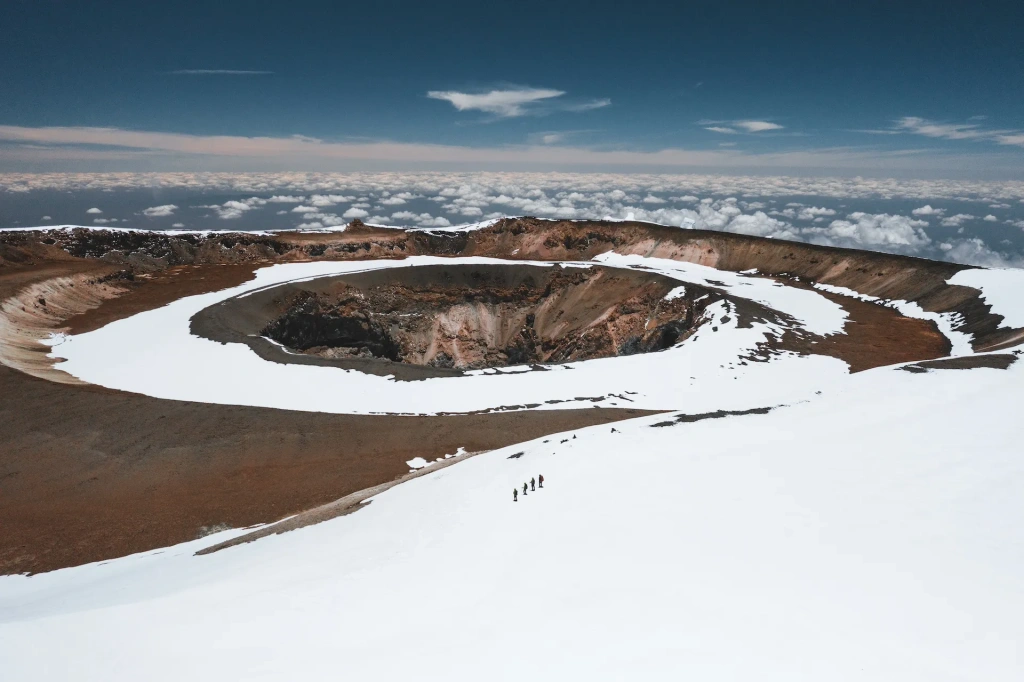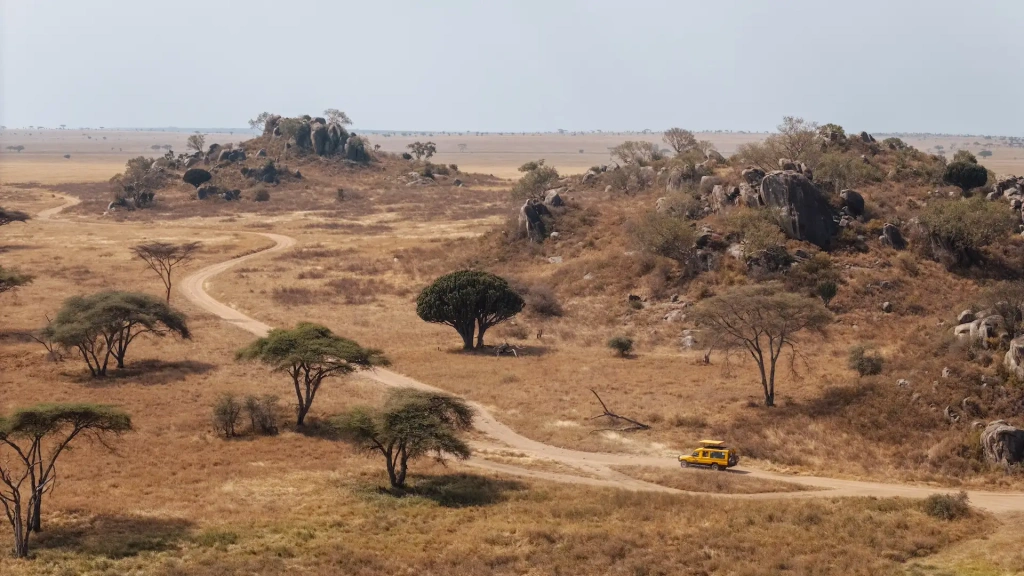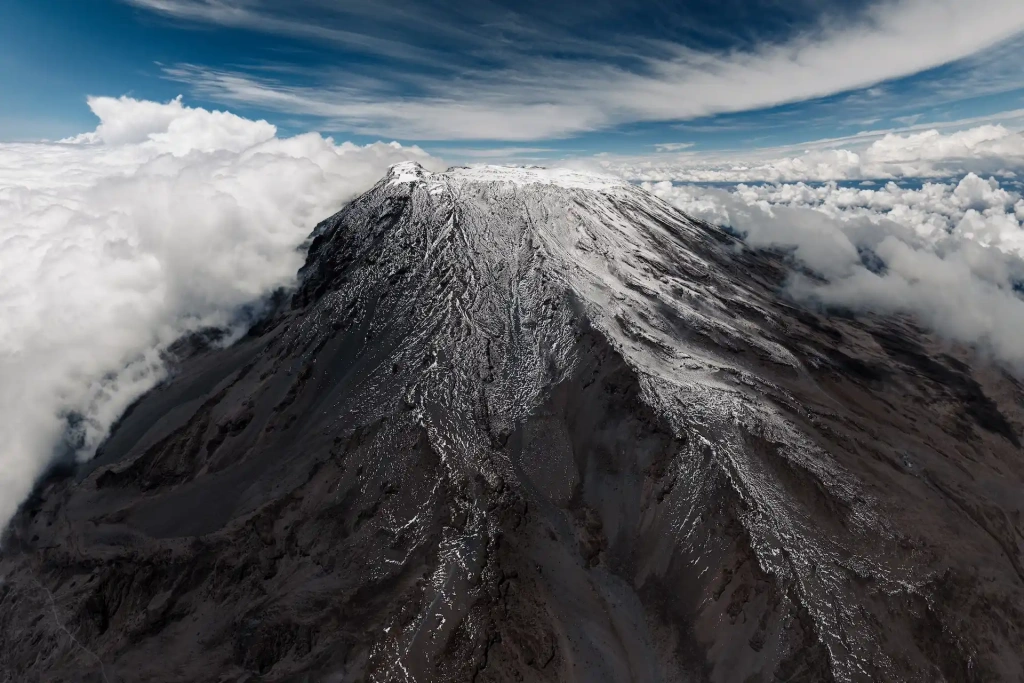Flying a drone in Tanzania requires special permits. The process is complex and expensive, but it is the only legal way to operate a drone in the country. Without these permits, customs officials will confiscate your drone during baggage inspection, and national park rangers have the authority to seize it within the protected wildlife areas.
To use a drone in Tanzania's national parks, you need approvals from several authorities:
- The Tanzanian embassy in your home country
- Tanzania Film Board
- Tanzania Civil Aviation Authority
- The National Parks Authority (TANAPA)
- The Ministry of Defense and National Service
Depending on the length of your trip and the parks you plan to visit, the total cost of getting drone filming permits starts at $5,000. In addition to the permits, the Ministry of Defense will assign an officer to accompany the drone operator throughout the entire trip.
With these permits, you can use the drone almost anywhere in Tanzania, including on all Kilimanjaro climbing routes, Serengeti plains, and other national parks. The only exception is the Ngorongoro Conservation Area, which requires an additional special permit. For more details, see the section "Filming in Ngorongoro."
You are not allowed to film government buildings, military personnel, police, or large gatherings of people. This rule applies not only to drones but also to regular cameras and smartphones. In urban areas, you will need additional permits.
Expert Opinion
It's impossible to show a fixed cost for drone filming in advance. The total expense depends on the length of the trip, the parks you choose, and the hotels. We calculate the cost individually for each expedition. If you plan to film with a drone in Tanzania, contact our experts. We'll provide a cost estimate for all permits within 24 hours.

For more details about each type of permit, see the sections below.
How do we know all these details?
Every year, we conduct multi-day promotional shoots for Altezza Travel, most of which take place in Tanzania's national parks. Our filming teams use drones for panoramic shots. Before each shoot, our manager contacts the relevant authorities to confirm the current permit requirements and submits the necessary applications. All Altezza Travel shoots comply fully with the law—we only use drones after obtaining all required permits.
Several times a year, we obtain drone permits for our clients. Advertising agencies, music video directors, and individual travelers who want to capture stunning footage of Tanzania for reach out to us.

Permit from Tanzania Film Board
To obtain a permit from the Film Board, download and fill out the application. The application requires basic information about the upcoming shoot: purpose, locations, names of the operators, and similar details. A general description of the project is sufficient for approval.
You need to endorse the completed application at the nearest Tanzanian embassy. In Europe, Tanzanian embassies are located in Berlin, Rome, Stockholm, Paris, London, and Brussels. In North America, they are in Washington, New York, and Ottawa. The only embassy in the former USSR is in Moscow. If you decide to arrange permits through Altezza Travel, we will contact the embassy on your behalf and clarify the requirements.
After you get embassy approval, send the endorsed application to Tanzania to the Television Council. There is a processing fee: $1,000 for a 30-day issuance and $3,000 for an expedited seven-day process.
Civil Aviation Authority Permit
To get a permit from the Civil Aviation Authority, download and fill out two applications from their website: one for importing the drone into Tanzania and another for using it within the country. Submit the completed applications to the main office of the authority in Dar es Salaam.
Fees vary based on the type of filming—personal or commercial—and range from $100 to $1,000. Additional fees for import and registration depend on the type and weight of the drone, ranging from $50 to $300.
Permit from the Ministry of Defense and National Service
To obtain a permit from the Ministry of Defense, write a letter addressed to the Minister of Defense of Tanzania, requesting permission to film with a drone in the national parks. Once the application is approved, the ministry issues a written permit. There are no fees for this permit, but they will assign a military officer to accompany the film crew at all drone filming locations.
You must include the officer's expenses in your budget. These expenses include a daily allowance of $100, hotel accommodation, meals with the tour participants, and park entry fees. If drone filming is planned on Mount Kilimanjaro, you need to add the cost of renting climbing gear. Essentially, the officer becomes an additional member of your expedition.
All the officers we've worked with on filming expeditions have been pleasant and well-mannered individuals with good English skills. They wear civilian clothes during the trip and blend in with other travelers.
Tanzania National Parks Authority Permit
You should apply for this permit once you’ve collected all others. It requires a letter addressed to the Conservation Commissioner of the National Parks Authority, along with copies of the permits from the Tanzania Film Board, Civil Aviation Authority, and the Ministry of Defense.
The National Parks Authority charges additional fees for filming in the national parks. For the 2024-2025 season, the fees are $300 per day for filming in Serengeti or Nyerere, and $250 per day for filming in Kilimanjaro and other parks. Filming in the southeastern national parks of Gombe and Mahale Mountains is subject to a reduced rate of $180 per day.
Expert Opinion
These are not special drone filming fees; they are called "filming fees," and anyone conducting professional filming within the park must pay them. According to the Parks Authority, any drone filming is considered professional. Therefore, both large wildlife documentary crews and solo travelers filming for personal archives must pay this fee. The fees are charged "per operator," meaning each person handling a drone or camera is required to pay.

Restrictions on drone use in the national parks
When using a drone in the national parks, you must follow these conditions:
- Minimum flying height is 50 meters.
- Do not use the drone when other travelers are nearby.
- Notify the head ranger of the park about drone use. Your safari guide will handle this.
- The national park may assign a ranger to accompany your group along with the military officer during filming. Unlike the military officer, the ranger does not require a daily allowance or accommodation with the expedition. The ranger will stay with you only during filming and return to the ranger station in the evening.
- You cannot use a drone to film the Great Migration crossings at the Mara and Grumeti rivers. For detailed reasons, see the section "Why are the procedures so complicated?"
Drone filming in Ngorongoro needs a special approval
Drone filming in Ngorongoro is generally prohibited. The conservation area is not under the jurisdiction of the National Parks Authority; instead, it is managed by the Ngorongoro Conservation Area Authority, a special agency that sets its own visitation rules. There is no standard protocol for getting drone filming permits, and applications are reviewed on a case-by-case basis.
We have experience in securing permits for filming in Ngorongoro. Applications are only approved for wildlife documentaries and high-budget marketing shoots that have the potential to attract thousands of new travelers. The Authority will not grant permits for filming for personal archives or Instagram blogs.
How long does it take to get the Tanzania drone permits?
Getting all the necessary permits typically takes 3-4 months. You can speed up the process to 1-2 months, but this will require additional meetings and incur extra costs.
Filming in the cities requires special permits
To film in cities, you need permits from the police and local authorities. Usually, obtaining these permits is straightforward and free of charge.
However, certain locations and people are off-limits for filming:
- Government buildings: police stations, immigration offices, tax offices, prisons, military facilities, etc.
- Law enforcement personnel: soldiers, police officers, and prison staff. You may also see prisoners in orange uniforms working along the roadside; they cannot be filmed either.
- Airports, hospitals, and fire stations.
Finally, large gatherings of people at concerts and rallies require special permission to film.
Filming in hotels - only with the manager's permission
Hotel owners may restrict drone use to ensure the privacy of other guests. Even if you have all the necessary permits, always ask the hotel manager for permission before starting any filming on the hotel property. To save time, we can handle this for you before your trip.
Be prepared for some hotels to allow filming only during the day when most guests are out on safari.
What happens if one attempts to bring a drone to Tanzania without a permit?
The most likely scenario is that customs will find and confiscate your drone during baggage inspection. While they are supposed to return it when you leave Tanzania, we don't have concrete information on how this process works in practice.
If the drone isn't detected at the airport, rangers will definitely spot it when you try to use it in a national park. If they confirm you lack the necessary permits, they will confiscate the drone and fine you for illegal drone use. They will also fine the tour operator for not informing you about the drone regulations. Your accompanying guide might lose their license. The drone will be confiscated and most likely not returned.
Filming away from rangers is not an option; ranger posts are evenly distributed throughout national parks, and key locations are under constant surveillance. Even if a ranger doesn't see the drone, they will likely hear it. Additionally, other group guides will inform rangers about the drone.
In Kilimanjaro National Park, additional security measures include scanning tourists' backpacks like at the airport, ensuring drones are detected at the entrance.
Overall, filming without permits involves significant risks.
Why are the Tanzania drone laws and procedures so complicated?
These regulations exist to protect wildlife, ensure the comfort of travelers, and safeguard critical infrastructure.
Tanzania's national parks attract around a million visitors annually, and drones are readily available and easy to use. If every tenth visitor to Serengeti or Kilimanjaro launched a drone, it would cause significant harm to animals and birds. Drones produce unnatural, irritating noise that frightens and disorients wildlife. The National Parks Authority has established these rules to limit drone use to two categories of visitors:
- Major media projects that will attract new travelers to Tanzania
- Wealthy visitors who, by paying substantial fees, contribute to the country's budget
Additionally, a large number of drones would ruin the experience for other travelers. National park visitors pay thousands of dollars to enjoy the serene sounds and beautiful landscapes of the savanna, to watch African sunsets from the slopes of Kilimanjaro, and to walk the same paths as Africa's early explorers. The constant buzzing of drones would destroy this atmosphere and diminish the sense of adventure.
Finally, aerial filming allows detailed views of critical infrastructure such as hospitals, police stations, military bases, and energy facilities. The Ministry of Defense assigns an officer to accompany the group to ensure drones are not flown near these sensitive locations.
Can I obtain all permits on my own?
Yes, you can, but the process requires visiting the cities of Arusha, Dar es Salaam, and Dodoma and having face-to-face meetings with representatives from various authorities. Submitting all applications online may result in delays or no response at all.
In practice, this means that to ensure you get the permits, you would need to arrive in Tanzania several months before your main trip, visit all the relevant offices, and schedule and attend 8-10 meetings. The cost of such a trip would exceed the fees for the permits.
We haven't heard of any successful cases of obtaining permits independently. As far as we know, all successful filming projects in Tanzania have submitted their applications through representatives.
How to obtain a drone filming permit in Tanzania?
Notify our manager if you plan to film with a drone. We will prepare all the necessary documents, submit them on your behalf to the relevant authorities, and ensure timely receipt of the filming permit.
The only task you need to do personally is to send the application for certification to the embassy. Tanzanian embassies accept applications only from within their respective consular jurisdictions, and we cannot do this directly from Tanzania. For example, the embassy in Paris also serves Spain, Portugal, Morocco, and Tunisia. If you live in Valencia, you will need to print the application we filled out for you, sign it, and mail it from Spain to the embassy. Once you receive a response, scan it and send it to us in Tanzania. We will handle all the other documents and procedures.
All content on Altezza Travel is created with expert insights and thorough research, in line with our Editorial Policy.
Want to know more about Tanzania adventures?
Get in touch with our team! We've explored all the top destinations across Tanzania. Our Kilimanjaro-based adventure consultants are ready to share tips and help you plan your unforgettable journey.



















Hi, unfortunately, the regulations do not differentiate between amateur, professional, or other types of drones. Even devices as small as the DJI Neo, traditional Mavics, and any other flying equipment fall within the scope of these rules, so the same procedures must be followed.
We understand this might feel frustrating, but these regulations are in place to protect the environment. On the bright side, following the proper procedures makes all legitimately captured footage rare and more impactful :)